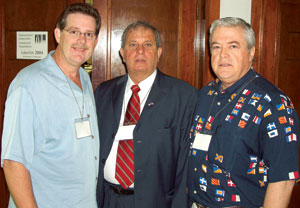Cuba To Buy $18 Million More From Alabama

Agriculture and Industries Commissioner Ron Sparks has announced that trade negotiations between Alabama agribusiness leaders and Cuban trade officials have resulted in approximately $18 million in new contracts for Alabama products.Agreements were made to purchase nearly $9 million in poultry products and over $10 million in transmission poles–with negotiations ongoing for additional lumber sales–plus several containers of snack foods.”Clearly, the results from this trip show how Alabama profits from exporting to Cuba,” said Sparks. The commissioner has focused attention on increasing the growth of Alabama exports to Cuba because it had been an underutilized market.Since 2002, Alabama has increased sales of products such as poultry, soybeans and timber to Cuba to $15 million in direct cash sales, equal to an approximate $50 million annual economic impact for the state. The estimated annual economic impact of the new contracts could be as much as $60 million.”Alabama cannot afford to ignore this growing market. We have worked hard to establish trade relations that can truly make a significant difference to the people here, and we need to continue to nurture that relationship for the sake of our farmers, producers and workers,” Sparks said.During a three-day conference in December, agribusiness leaders were able to negotiate directly with Pedro Alvarez, chairman and CEO of ALIMPORT. ALIMPORT is the Cuban purchasing agency responsible for determining the needs of the Cuban market and selecting the products and importers that meet those needs. Alvarez expressed appreciation for the food products imported from Alabama businesses and reassured Sparks that Cuba would double the number of purchases from Alabama in the near future. Trade between Cuba and Alabama businesses is a continual process.”Trade with Cuba offers an excellent opportunity to expand the market for Alabama poultry, beef, timber and other commodities produced in our state,” said Mike Kilgore, executive director of the Alabama Farmers Federation. “I was impressed with the high regard Cuban trade officials hold for our state and specifically the agricultural products we produce.”The delegation that visited Cuba included legislators from districts that have agricultural industries that have shown interest in trade with Cuba.”As part of the delegation that visited Cuba last year, I can see this year that Alabama’s ties to Cuba have only grown stronger. Commissioner Sparks has done an excellent job of building trade relations with Cuba, and this is good news for Alabamians,” said Sen. Lowell Barron (D-Fyffe). “We again signed contracts for the sale of poultry and various agriculture commodities to Cuba. Poultry is a leading farm product in my area, and expanding markets for our agricultural producers means not only putting food on the tables of Cuban families, it helps put food on the table for Alabama’s families.”The United States Department of Commerce provides the license that allows individual businesses to export products to Cuba. The process to obtain a license can take as long as two months, after which the products may be shipped from the Port of Mobile. The Alabama Department of Agriculture and Industries and the Alabama State Port Authority also have secured approximately $50 million worth of regional products to be shipped through the Port of Mobile.In addition to signing contracts for 8,500 transmission poles and 10,800 metric tons of poultry during the trip, Cuba officials also agreed to purchase several containers of snack food products from Alabama-based companies and building materials from the state’s lumber companies. The delegation also provided Cuba officials samples of other products for testing and evaluation, and over 5,000 tons of Alabama-raised poultry arrived in Cuba for unloading during the trip.For more information, contact Dr. John Gamble or John Curry Key at (334) 240-7224.
